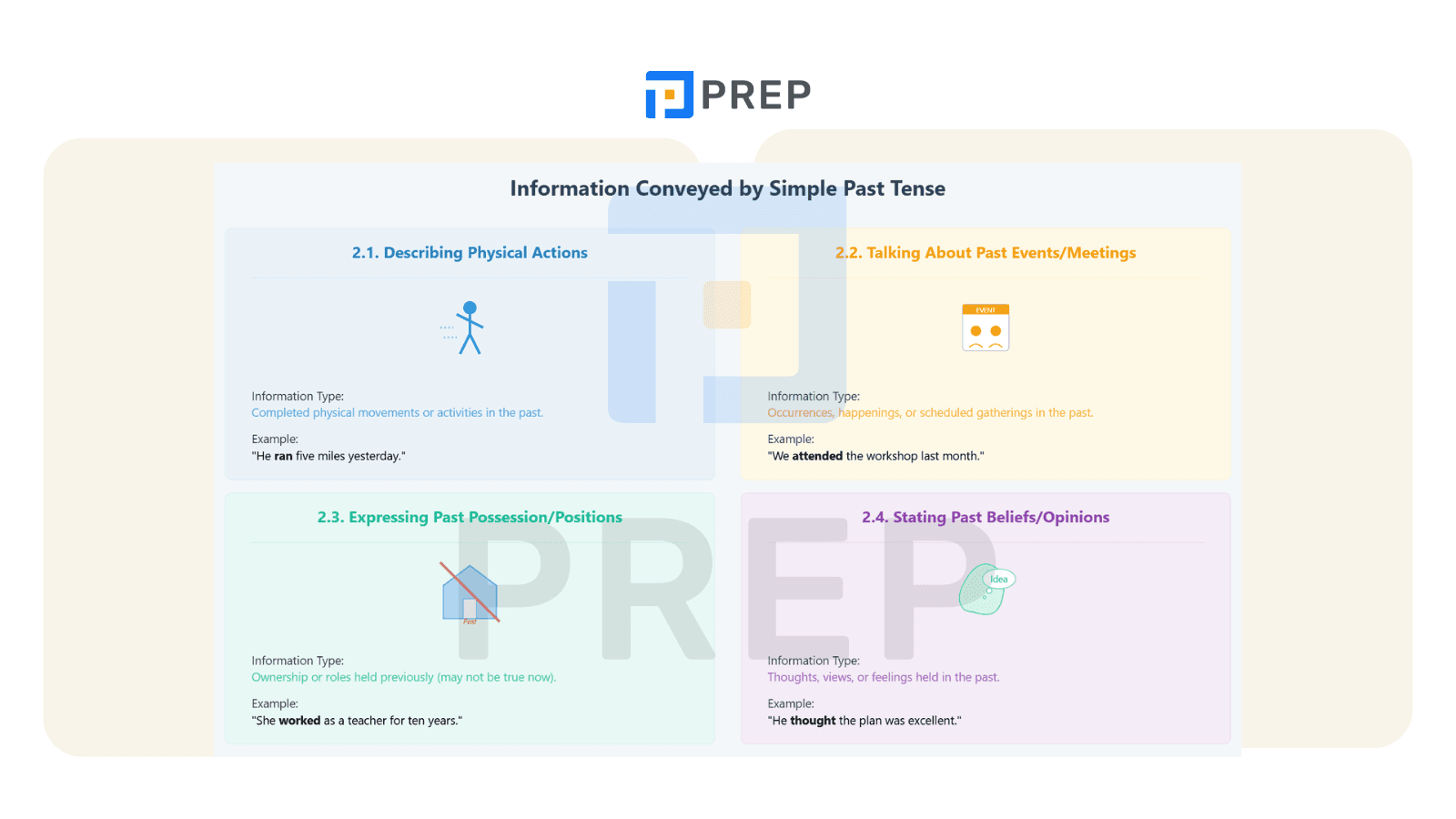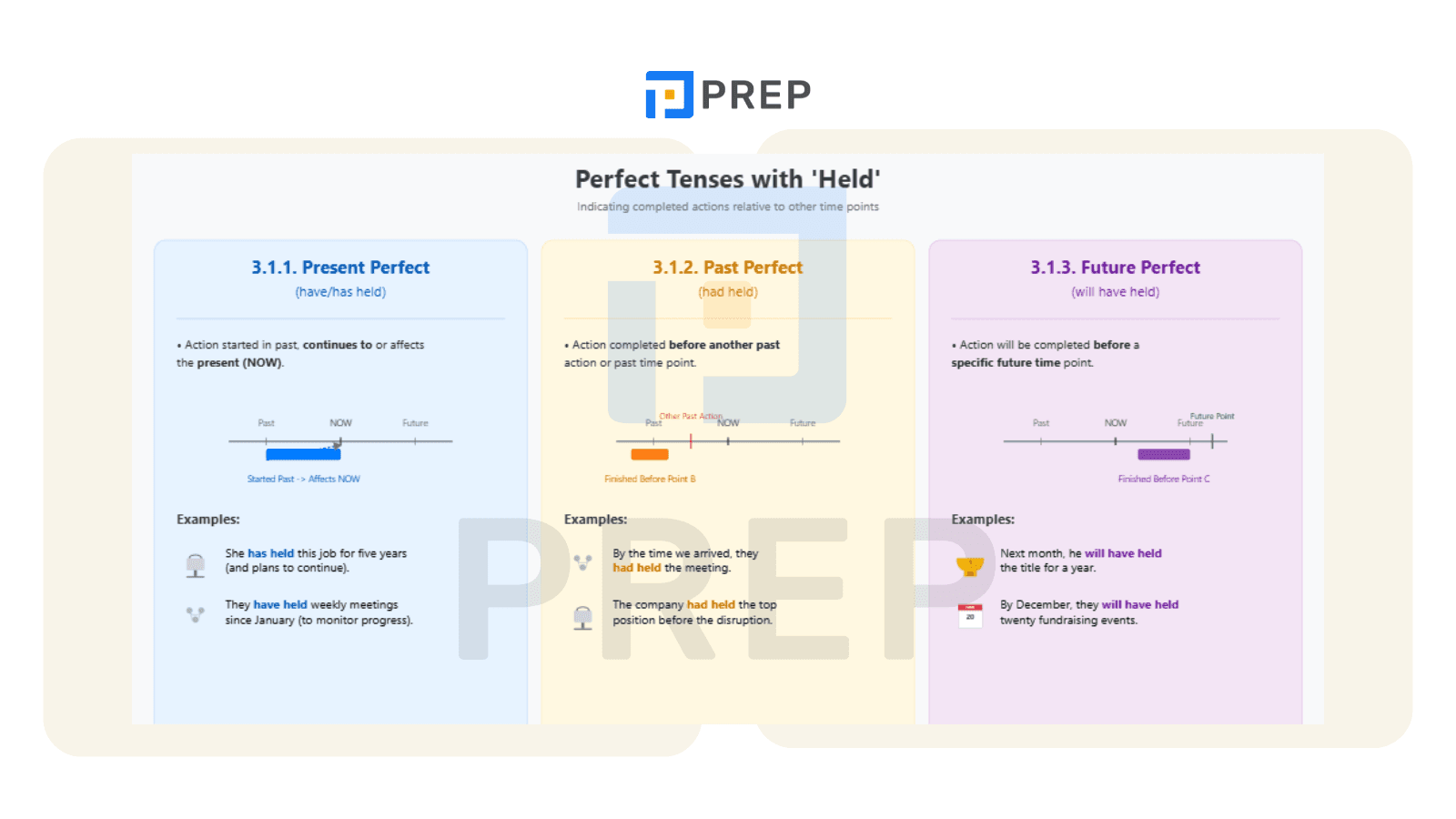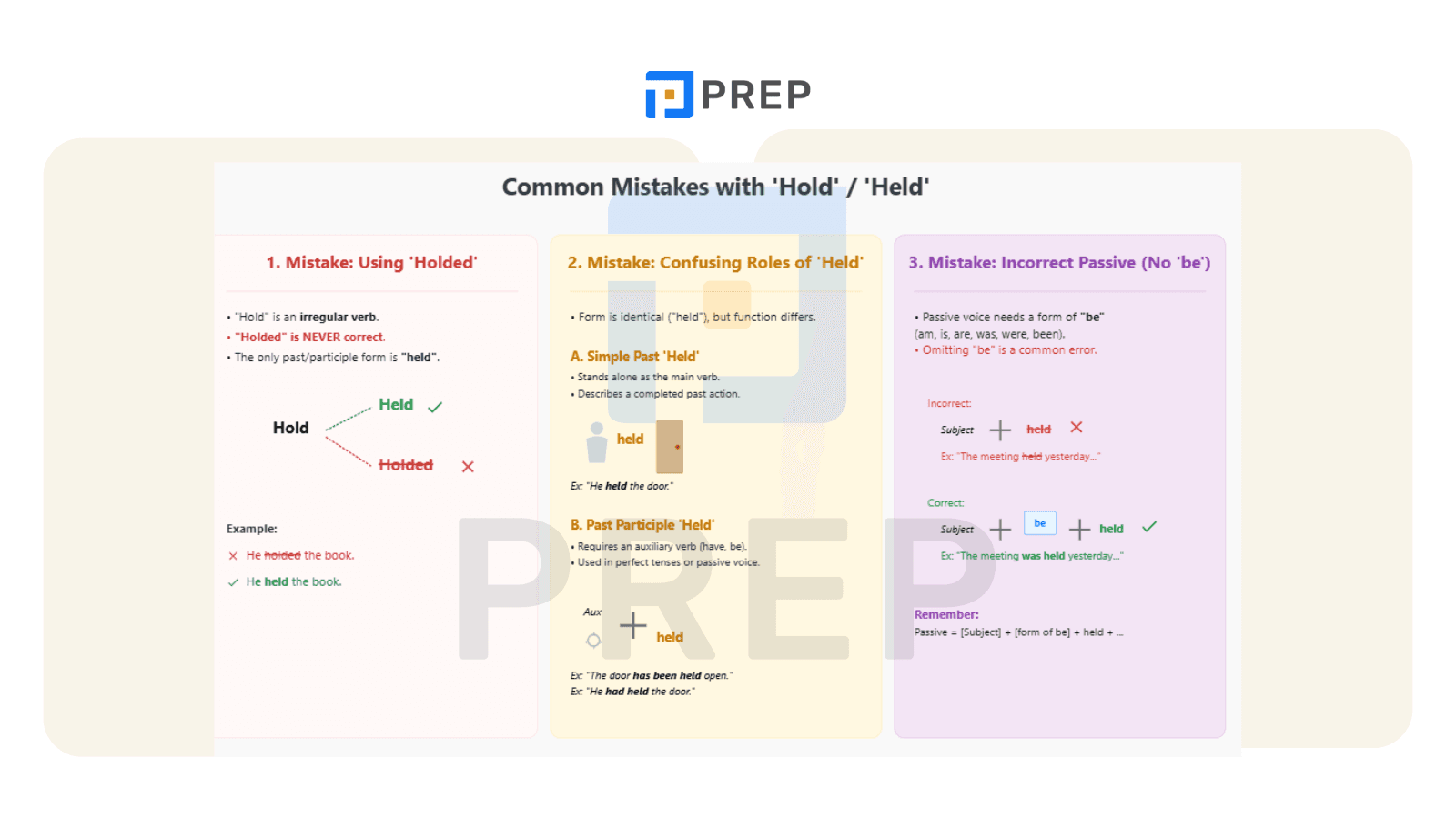The Definitive Guide to Using “Held” as the Past Tense of Hold
This comprehensive guide explores the irregular past tense form "held" derived from the verb "hold." The content systematically examines how past tense of hold - "held" functions in English grammar as both the simple past tense and past participle form. It details various contexts for using "held," including physical actions, events, positions, and beliefs. The guide explains perfect tense constructions, passive voice applications, common idiomatic expressions, and potential mistakes to avoid. Through detailed examples and explanations, the content provides a thorough understanding of this irregular verb's usage patterns, grammatical functions, and practical applications in English communication.
- 1. The Past Tense of Hold
- 2. Understanding 'Held' in action
- 3. Using 'Held' as a past participle
- 4. "Held" in common English idioms and expressions
- 5. Avoiding common mistakes to use 'Held' correctly
- 6. Related questions and insights about the past tense of Hold
- 6.1. What fundamentally defines an irregular verb like "hold" compared to a regular verb?
- 6.2. Are there other common English verbs that form their past tense in a pattern similar to "hold"?
- 6.3. Is the word "holded" ever considered grammatically correct in any English dialect or context?
- 6.4. How does the cognitive effort of learning irregular verbs like "held" compare to that of learning regular verbs for new language learners?

1. The Past Tense of Hold
The past tense of hold is "held." Unlike regular verbs that simply add "-ed" to form their past tense, "hold" follows an irregular pattern. This transformation exemplifies English's irregular verb system, where the vowel changes from "o" to "e" while retaining the consonant structure.
"Held" serves dual functions in English grammar - it works as both the simple past form and the past participle of "hold." This versatility makes understanding how "held" operates in different grammatical contexts essential for effective communication.
2. Understanding 'Held' in action
The simple past tense describes completed actions that occurred at a specific time in the past. The past tense of hold applies to numerous situations. Let's explore the primary applications of "held" across different contexts.
2.1. Describing physical actions in the past
This usage focuses on the literal meaning of holding something physically in the past.
2.1.1. Example: Grasping an object
She held the fragile vase carefully while moving it to the display case. He held his ticket tightly as he rushed through the crowded station.
2.1.2. Example: Supporting something
The ancient pillar held the roof's weight for over five centuries despite the earthquakes. I held the door open for them while they carried in the heavy furniture.
The hold past simple form works effectively when narrating completed actions with a clear timeframe.
2.2. Talking about past events & meetings
"Held" commonly describes the organization or occurrence of gatherings and events.
2.2.1. Example: Formal gatherings
The board held an emergency meeting to address the financial crisis last Tuesday. Our university held its graduation ceremony outdoors despite the threat of rain.
2.2.2. Example: Social occasions
They held a surprise party for her birthday at the local restaurant. We held a barbecue last summer that brought together friends we hadn't seen in years.
This usage of the past form of hold appears frequently in news reporting and formal communications.
2.3. Expressing past possession or positions
This usage relates to owning something or occupying a role or position in the past.
2.3.1. Example: Owning something
For centuries, the family held that estate until economic hardship forced them to sell. The museum held a rare collection of ancient manuscripts that attracted scholars worldwide.
2.3.2. Example: Occupying a role
She previously held the position of Marketing Manager before her promotion to Director. He held the world record for the 100m dash until it was broken last year.
This application of held past tense often appears in professional contexts and historical accounts.
2.4. Stating past beliefs or opinions
In more formal contexts, "held" can express views or beliefs maintained in the past.
2.4.1. Example: Personal views
He held unconventional views on politics that often sparked intense debates among his colleagues. She always held that honesty was vital in both personal and professional relationships.
2.4.2. Example: General consensus
In the past, it was widely held that the Earth was flat until explorers and scientists proved otherwise. The court held that the evidence was insufficient to convict the defendant.

3. Using 'Held' as a past participle
The hold past participle "held" forms perfect tenses with helping verbs with helping verbs (have, has, had) and creating passive voice constructions with forms of "be." The word "held" fulfills both these roles, making it a versatile component in expressing complex time relationships and shifting focus in sentences.
3.1. Forming Perfect Tenses with 'Held'
Perfect tenses indicate actions completed relative to another point in time, using "held" with auxiliary verbs to create more complex timeframes.
3.1.1. Present Perfect (have/has held)
This indicates action that started in the past and continues or affects the present.
-
She has held this job for five years and plans to continue working there.
-
They have held weekly meetings since January to monitor the project's progress.
3.1.2. Past Perfect of Hold(had held)
This indicates an action completed before another past action.
-
By the time we arrived, they had held the meeting and reached their decision.
-
The company had held the top market position for decades before the industry disruption.
The past perfect of hold indicates actions completed before another past point in time.
3.1.3. Future Perfect (will have held)
This indicates action that will be completed before a future point.
-
Next month, he will have held the title for a year, marking an important milestone.
-
By December, they will have held twenty fundraising events throughout the city.

3.2. Constructing the Passive Voice with 'Held'
Passive voice constructions use a form of "be" plus "held" to shift focus from the doer to the receiver of an action or to emphasize the event itself rather than who performed it.
3.2.1. Understanding the Structure (be + held)
The passive structure with "held" follows the pattern: [form of "be"] + "held" + [additional information]. This construction emphasizes what was held rather than who did the holding.
3.2.2. Past Passive Example
This describes events that occurred in the past. The elections were held last Tuesday with record voter turnout. The ceremony was held outdoors despite the unexpected rainfall.
3.2.3. Present Passive Example
This describes regular or scheduled events in the present. The seminars are held weekly in the main conference room. Community meetings are held on the first Monday of each month.
3.2.4. Future Passive Example
This describes planned future events. The final exam will be held in June rather than May as originally scheduled. Next year's conference will be held in Toronto instead of Vancouver.
4. "Held" in common English idioms and expressions
"Hold" forms numerous phrasal verbs and idiomatic expressions where "held" serves as the past tense form. These expressions often carry meanings that differ from the literal sense of physically holding something, enriching your vocabulary and communication
4.1. Understanding "held one's breath"
This idiom describes a moment of suspense or anticipation. We all held our breath as the winner was announced. The expression captures that moment of suspended animation when something important is about to happen.
4.2. Understanding "held one's tongue"
To "hold one's tongue" means to remain silent, especially when speaking might cause problems. She wisely held her tongue during the heated argument. This demonstrates restraint and self-control in communication.
4.3. Understanding "held someone accountable/responsible"
This phrase indicates assigning responsibility or expecting someone to answer for their actions. The manager held the team responsible for meeting the deadline. It conveys authority and establishes clear expectations.
5. Avoiding common mistakes to use 'Held' correctly
Even fluent English speakers occasionally make errors with irregular verbs like "hold." Awareness of these common mistakes will help you use "held" correctly and confidently in both written and spoken English.
5.1. Mistake 1: Using 'Holded'
The most frequent error is attempting to apply regular verb rules to "hold." Remember that "holded" is never correct. The only past form is "held," regardless of context or usage.
5.2. Mistake 2: Confusing Hold past simple and Hold past participle 'Held'
While both forms look identical, they function differently grammatically. Simple past "held" stands alone as the main verb in a sentence (He held the door). Past participle "held" requires an auxiliary verb (The door has been held open).
5.3. Mistake 3: Incorrect passive voice formation (forgetting 'be')
A common error in passive constructions is omitting the required form of "be." Incorrect: "The meeting held yesterday at 2 PM." Correct: "The meeting was held yesterday at 2 PM." The auxiliary "was" is essential for proper passive voice construction.
 6. Related questions and insights about the past tense of Hold
6. Related questions and insights about the past tense of Hold
Let's address some natural questions that arise when exploring the past tense of hold.
6.1. What fundamentally defines an irregular verb like "hold" compared to a regular verb?
An irregular verb changes form in ways that don't follow the standard pattern of adding "-ed" or "-d" to create past tense forms. While regular verbs follow predictable rules, irregular verbs like "hold" must be memorized individually as they transform through internal vowel changes or other unique modifications.
6.2. Are there other common English verbs that form their past tense in a pattern similar to "hold"?
While "hold" has a somewhat unique transformation, several verbs share similar vowel-change patterns. "Tell" becomes "told," and "sell" becomes "sold," exhibiting the reverse pattern of "hold" to "held." Additionally, "behold" follows the same pattern as its root, becoming "beheld." These patterns, though not universal rules, can aid memorization.
The transformation from "hold" to "held" primarily involves a vowel shift from "o" to "e." This internal modification exemplifies how English irregular verbs often preserve consonant structures while altering vowel sounds—a pattern dating back to Old English strong verbs.
6.3. Is the word "holded" ever considered grammatically correct in any English dialect or context?
No, "holded" is not grammatically correct in Standard English or any major recognized dialect. While non-standard forms occasionally appear in highly colloquial speech or children's developing language, "holded" remains unacceptable in formal writing, academic contexts, or language examinations.
6.4. How does the cognitive effort of learning irregular verbs like "held" compare to that of learning regular verbs for new language learners?
Irregular verbs initially demand greater cognitive resources since each must be memorized individually, unlike the pattern-based learning of regular verbs. However, many irregular verbs (including "hold") rank among the most frequently used in everyday English, making their mastery particularly rewarding through repeated exposure and practical usage.
Mastering the past tense of hold represents more than memorizing a single grammar rule—it signifies progress in your English fluency journey. By understanding how "held" functions across various contexts, you'll communicate more precisely in both written and spoken English. This fundamental irregular verb appears frequently in everyday communication, making its mastery particularly valuable for academic writing, professional settings, and standardized examinations. Continue building on this foundation to achieve your English proficiency goals with confidence and precision.

Hi I'm Chloe, and I am currently serving as an Product Content Administrator at Prep Education. With over five years of experience in independent online IELTS study and exam preparation, I am confident in my ability to support learners in achieving their highest possible scores.
Comment
Premium content
View allPersonalized roadmap
Most read












